| Listing 1 - 8 of 8 |
Sort by
|
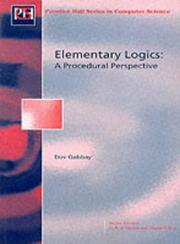
ISBN: 0137263651 Year: 1998 Publisher: New York : Prentice Hall Europe,
Abstract | Keywords | Export | Availability | Bookmark
 Loading...
Loading...Choose an application
- Reference Manager
- EndNote
- RefWorks (Direct export to RefWorks)
Book
ISBN: 3487098032 Year: 1998 Volume: 32 Publisher: Hildesheim : G. Olms,
Abstract | Keywords | Export | Availability | Bookmark
 Loading...
Loading...Choose an application
- Reference Manager
- EndNote
- RefWorks (Direct export to RefWorks)
Mathematics --- Number concept --- Algebra --- Logic, Symbolic and mathematical --- Mathématiques --- Concept de nombre --- Algèbre --- Logique symbolique et mathématique --- Philosophy --- Foundations --- Philosophie --- Fondations (Construction)

ISBN: 9780195080308 0195080300 Year: 1998 Publisher: New York : Oxford University Press,
Abstract | Keywords | Export | Availability | Bookmark
 Loading...
Loading...Choose an application
- Reference Manager
- EndNote
- RefWorks (Direct export to RefWorks)
In this collection of essays written over a period of twenty years, Solomon Feferman explains advanced results in modern logic and employs them to cast light on significant problems in the foundations of mathematics. Most troubling among these is the revolutionary way in which Georg Cantor elaborated the nature of the infinite, and in doing so helped transform the face of twentieth-century mathematics. Feferman details the development of Cantorian concepts and the foundational difficulties they engendered. He argues that the freedom provided by Cantorian set theory was purchased at a heavy philosophical price, namely adherence to a form of mathematical platonism that is difficult to support.
Logic, Symbolic and mathematical --- Logique symbolique et mathématique --- Logic, Symbolic and mathematical. --- Logique symbolique et mathématique --- Algebra of logic --- Logic, Universal --- Mathematical logic --- Symbolic and mathematical logic --- Symbolic logic --- Mathematics --- Algebra, Abstract --- Metamathematics --- Set theory --- Syllogism
Book
ISBN: 2130488994 9782130488996 Year: 1998 Volume: *7 Publisher: Paris: PUF,
Abstract | Keywords | Export | Availability | Bookmark
 Loading...
Loading...Choose an application
- Reference Manager
- EndNote
- RefWorks (Direct export to RefWorks)
Quels sont les problèmes philosophiques soulevés par les ordinateurs et par l'informatique ? Les réponses les plus fréquentes invoquent l'intelligence artificielle, la pensée des machines ou les théories computationnelles de l'esprit. Mais ces réponses occultent la possibilité d'une autre ouverture philosophique sur l'informatique, conçue à partir d'une réflexion sur la machine en logique. Comment comprendre que la logique, qui est à la fois une discipline de la pensée et un instrument d'analyse du langage, puisse devenir aussi bien une science des machines informatiques ? Pierre Wagner montre pourquoi la machine s'est progressivement imposée, depuis les années trente, comme l'un des objets majeurs de l'analyse logique ; et à partir de cette réflexion d'ordre historique, il trace les linéaments d'une philosophie des machines informatiques qui ne se réduit pas aux questions d'intelligence artificielle ou de théorie de l'esprit. L'ouvrage se présente également comme une introduction à certaines notions logiques fondamentales (les machines de Turing, le lambda-calcul, la correspondance de Curry-Howard...) dont l'auteur met en évidence la portée philosophique.
Computer science --- Logic, Symbolic and mathematical. --- Artificial intelligence. --- Informatique --- Logique symbolique et mathématique --- Intelligence artificielle --- Philosophy --- Philosophie --- Logic machines --- Logique mathématique --- Machines logiques --- Logique --- Histoire --- Intelligent machines --- Machines, Logic --- Logic --- Logic, Symbolic and mathematical --- Logique symbolique et mathématique --- Automation --- Logique mathématique. --- Philosophie. --- Histoire.
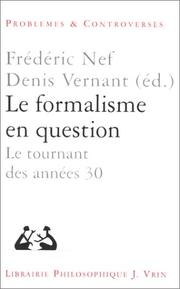
ISSN: 02497875 ISBN: 2711613399 9782711613397 Year: 1998 Volume: *51 Publisher: Paris: Vrin,
Abstract | Keywords | Export | Availability | Bookmark
 Loading...
Loading...Choose an application
- Reference Manager
- EndNote
- RefWorks (Direct export to RefWorks)
Formal languages --- Formele talen --- Languages [Formal ] --- Langues formalisées --- Talen [Formele ] --- Logic, Symbolic and mathematical --- Semantics (Philosophy) --- Science --- Logique symbolique et mathématique --- Sémantique (Philosophie) --- Langages formels --- Sciences --- Congresses. --- Semantics --- Philosophy --- Congrès --- Sémantique --- Philosophie --- Logic, symbolic and mathematical --- Congresses --- Logique symbolique et mathématique --- Sémantique (Philosophie) --- Congrès --- Sémantique --- Logic, Symbolic and mathematical - Congresses --- Semantics (Philosophy) - Congresses --- Formal languages - Semantics - Congresses --- Science - Philosophy - Congresses
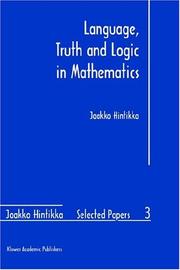
ISBN: 0792347668 9048149231 9401720452 9780792347668 Year: 1998 Volume: v. 3 Publisher: Dordrecht: Kluwer Academic Publishers,
Abstract | Keywords | Export | Availability | Bookmark
 Loading...
Loading...Choose an application
- Reference Manager
- EndNote
- RefWorks (Direct export to RefWorks)
One can distinguish, roughly speaking, two different approaches to the philosophy of mathematics. On the one hand, some philosophers (and some mathematicians) take the nature and the results of mathematicians' activities as given, and go on to ask what philosophical morals one might perhaps find in their story. On the other hand, some philosophers, logicians and mathematicians have tried or are trying to subject the very concepts which mathematicians are using in their work to critical scrutiny. In practice this usually means scrutinizing the logical and linguistic tools mathematicians wield. Such scrutiny can scarcely help relying on philosophical ideas and principles. In other words it can scarcely help being literally a study of language, truth and logic in mathematics, albeit not necessarily in the spirit of AJ. Ayer. As its title indicates, the essays included in the present volume represent the latter approach. In most of them one of the fundamental concepts in the foundations of mathematics and logic is subjected to a scrutiny from a largely novel point of view. Typically, it turns out that the concept in question is in need of a revision or reconsideration or at least can be given a new twist. The results of such a re-examination are not primarily critical, however, but typically open up new constructive possibilities. The consequences of such deconstructions and reconstructions are often quite sweeping, and are explored in the same paper or in others.
Mathematical logic --- Mathematics --- Logic, Symbolic and mathematical. --- Mathématiques --- Logique symbolique et mathématique --- Philosophy. --- Philosophie --- Logic, Symbolic and mathematical --- -Math --- Science --- Algebra of logic --- Logic, Universal --- Symbolic and mathematical logic --- Symbolic logic --- Algebra, Abstract --- Metamathematics --- Set theory --- Syllogism --- Philosophy --- -Philosophy --- Mathématiques --- Logique symbolique et mathématique --- Logic of mathematics --- Mathematics, Logic of --- Mathematical logic. --- Logic. --- Mathematics. --- History. --- Mathematical Logic and Foundations. --- History of Mathematical Sciences. --- Annals --- Auxiliary sciences of history --- Math --- Argumentation --- Deduction (Logic) --- Deductive logic --- Dialectic (Logic) --- Logic, Deductive --- Intellect --- Psychology --- Reasoning --- Thought and thinking --- Methodology
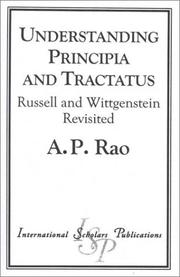
ISBN: 1573090980 1573090999 Year: 1998 Publisher: San Francisco London Bethesda International Scholars Publications
Abstract | Keywords | Export | Availability | Bookmark
 Loading...
Loading...Choose an application
- Reference Manager
- EndNote
- RefWorks (Direct export to RefWorks)
Description (Philosophy) --- Identiteit (Filosofie) --- Identiteit (Filosofisch begrip) --- Identity (Philosophical concept) --- Identité (Concept philosophique) --- Identité (Philosophie) --- Logic [Symbolic and mathematical ] --- Logica [Symbolische en wiskundige ] --- Logique symbolique et mathémathique --- Même (Philosophie) --- Mêmeté (Philosophie) --- Principe d'identité --- Language and languages --- Logic, Symbolic and mathematical --- Mathematics --- Description (Philosophie) --- Identité --- Langage et langues --- Logique symbolique et mathématique --- Mathématiques --- Philosophy --- Philosophie --- Russell, Bertrand, --- Wittgenstein, Ludwig, --- Identité --- Logique symbolique et mathématique --- Mathématiques --- Language and logic --- Logic of mathematics --- Mathematics, Logic of --- Linguistics and logic --- Logic in language --- Logic --- Semantics --- Identity --- Comparison (Philosophy) --- Resemblance (Philosophy) --- Wittgenstein, Ludwig --- Russell, Bertrand Russell --- Russell, Bertrand, - 1872-1970. - Principles of mathematics. --- Wittgenstein, Ludwig, - 1889-1951. - Tractatus logico-philosophicus.
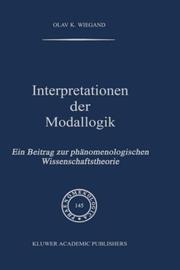
ISBN: 0792348095 9780792348092 Year: 1998 Volume: 145 Publisher: Dordrecht: Kluwer Academic Publishers,
Abstract | Keywords | Export | Availability | Bookmark
 Loading...
Loading...Choose an application
- Reference Manager
- EndNote
- RefWorks (Direct export to RefWorks)
Das Buch beabsichtigt, mit den Mitteln einer phänomenologischen Semantik, einen Beitrag zum Verständnis der Modallogik und ihrer philosophischen Implikationen zu liefern. Es richtet sich in erster Linie an Phänomenologen, aber auch an analytische Philosophen und an philosophisch interessierte Logiker.Bereits im vorigen Jahrhundert begannen Mathematik und Logik, sich zu abstrakten Wissenschaften zu entwickeln. Husserl nannte die schließlich resultierende Einheit beider `Mathesis Universalis'. Diese bildet nicht nur den Boden aus dem Husserls philosophische Arbeit erwuchs, sondern auch den Rahmen, in den die moderne Modallogik zu stellen ist. Als abstrakte Disziplin der Mathesis Universalis erfordert ihre phänomenologische Aufklärung detaillierte Analysen der Genese von Modalisierung, die weit in die kognitiven Strukturen von (vorsprachlicher) Wahrnehmung hineinreichen. Das so gewonnene Verständnis von Modalisierung erbringt ein zweifaches Resultat: Zum einen kann die insbesondere im Rahmen der analytischen Philosophie geführte Diskussion der erkenntnistheoretischen und ontologischen Schwierigkeiten der Modallogik eine phänomenologische Aufklärung erfahren. Zum anderen erlaubt die Tatsache, daß der Beweisbegriff als mathematische Modalität zu verstehen ist, eine präzise phänomenologische Bestimmung des Verhältnisses von formaler Logik und Mathematik.
Fenomenologie --- Logic [Symbolic and mathematical ] --- Logica [Symbolische en wiskundige ] --- Logique symbolique et mathémathique --- Modaliteit (Logica) --- Modality (Logic) --- Modalité (Logique) --- Phenomenology --- Phénoménologie --- Logique symbolique et mathématique --- Logic, symbolic and mathematical --- Modal logic --- Nonclassical mathematical logic --- Bisimulation --- Algebra of logic --- Logic, Universal --- Symbolic and mathematical logic --- Symbolic logic --- Algebra, Abstract --- Metamathematics --- Syllogism --- Phenomenology. --- Modality (Logic). --- Modalité (Logique) --- Logique symbolique et mathématique --- Phénoménologie --- Logic, Symbolic and mathematical --- Science --- Philosophy, Modern --- Logic --- Mathematical logic --- Mathematics --- Set theory --- Normal science --- Philosophy of science --- Philosophy --- Theory of knowledge --- Logic, Symbolic and mathematical. --- Philosophy. --- Sciences --- Philosophie --- Science - Philosophy --- Logique modale
| Listing 1 - 8 of 8 |
Sort by
|

 Search
Search Feedback
Feedback About UniCat
About UniCat  Help
Help News
News